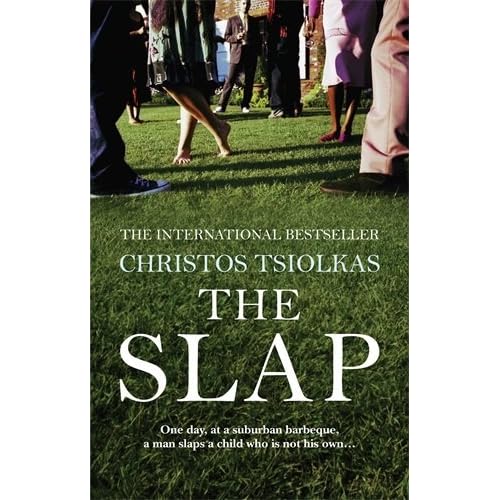 A Gen-X story, The Slap is set in Melbourne with a Greek family at the pivot point. Hector, the protagonist, is married to Aisha, an Indian girl. The two of them are the envy of their friends, set in their perfect lives, with two children. Of course, there is no such thing as perfection, once you peel away the layers, but on the face of it, they are pretty much "perfect." Aisha is vet; Hector is a bureaucrat.
The two of them host a barbecue one afternoon, inviting their friends and family as well as the children. Disagreements between the kids (Spiderman on TV?), unease with the in-laws, and tensions building between some friends sums up the afternoon, although again, on the face of it, everyone seems to be having a good time. But then, the facade falls when Harry, Hector's cousin, slaps a brattish four-year old across the face, and that's the tipping point.
A Gen-X story, The Slap is set in Melbourne with a Greek family at the pivot point. Hector, the protagonist, is married to Aisha, an Indian girl. The two of them are the envy of their friends, set in their perfect lives, with two children. Of course, there is no such thing as perfection, once you peel away the layers, but on the face of it, they are pretty much "perfect." Aisha is vet; Hector is a bureaucrat.
The two of them host a barbecue one afternoon, inviting their friends and family as well as the children. Disagreements between the kids (Spiderman on TV?), unease with the in-laws, and tensions building between some friends sums up the afternoon, although again, on the face of it, everyone seems to be having a good time. But then, the facade falls when Harry, Hector's cousin, slaps a brattish four-year old across the face, and that's the tipping point.
The drama that unfolds is almost unbelievable, with the parents looking to press charges - the mother is one of Aisha's best friends - and Hector and Aisha trying to maintain some kind of decorum. Hector sides with his cousin, and Aisha with her friend. Stalemate.
But, this linear narrative isn't just focused on the slap. One could argue for days as to whether the slap was deserved or not, and still not reach a verdict. Instead it focuses on the people at the barbecue, their reaction to the slap, and which side they're on. It also gives us a peek into the lives and thoughts of a bunch of people living in the middle-class Melbourne community. Apparently, affairs are rampant, alcoholism and recreational drugs common and racism and homophobia normal. Oh, and the slang is profanity-intensive.
I'm not sure I enjoyed the peek though. While some seemingly perfect characters had a massive fall from grace, the lack of self-awareness to the degree of coming across as complete morons was evident in others. Some people had over-inflated opinions of themselves, and some had haunting pasts. As the narrative progressed, we learnt more about all of them, and for the most part, they became more and more unlikeable. I'm an idealist, hate the very idea of cheating and don't really care about the boxes that society puts people in. As long as someone's "nice," it's good enough for me. So, reading this book had alarm bells jangling in my head almost like there's no tomorrow.
It's not a literary novel, and personally, I think the author tries too hard to be too controversial. Each chapter is written from the point of view of one of the characters (including Hector, Aisha, Harry, Hector's father, the slapped child's mother etc), and each chapter brings with it a plethora of expletives. Do parents, grand-parents and children actually use four letter words with one another as part of normal conversation? Again, maybe I'm super-conservative, but I don't think I've ever sworn in front of my parents... and vice versa.
I was really looking forward to reading this book, and I guess I had extremely high expectations from this book, which were unfortunately not met. Maybe I would've enjoyed this book a lot more if I hadn't opened it with about a million pre-conceived notions! That always happens to me!
What did you think of The Slap? Do you think badly behaved children deserve to be slapped? And does it have a place in the Booker shortlist?
I'm inclined to reply in the negative to the last question, but hey! What do I know?!
 Peter Carey, an Australian novelist, is one of only two authors to have won the Booker Prize twice, for the works
Peter Carey, an Australian novelist, is one of only two authors to have won the Booker Prize twice, for the works